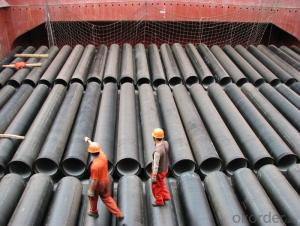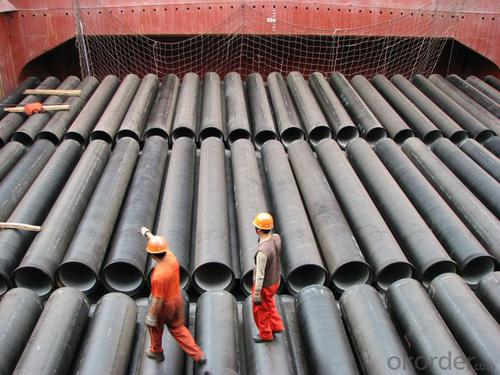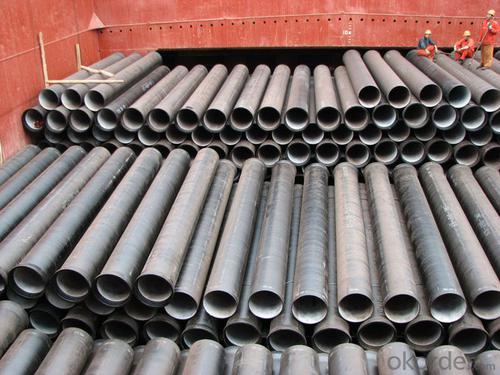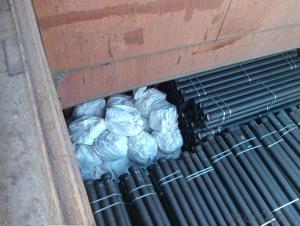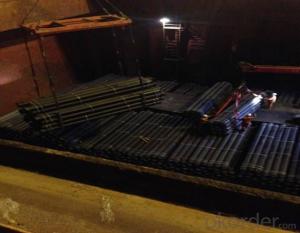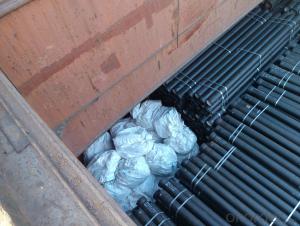DUCTILE IRON PIPE DN450 K8/C
- Loading Port:
- China Main Port
- Payment Terms:
- TT OR LC
- Min Order Qty:
- -
- Supply Capability:
- -
OKorder Service Pledge
OKorder Financial Service
You Might Also Like
Specification:
1) The standard of pipe: ISO2531:1998, K9
2) Effective length: 6m
3) Inner cement line: Portland cement line as per ISO4179
4) Zinc coating: at least 130g/m2 as per ISO8179
5) Bitumen painting: at least 70um as per ISO8179
6) With 100% quantity of NBR ring, or SBR ring, or EPDM ring as per ISO4633
7) DN80mm-800mm
8) High strength, lighter than grey iron, good corrosion resistance, no furring, small flow resistance, easy fixing, long life tome about 100 yeas
9) Produced by Hangzhou chunfeng machine
10) Checked by automatic inspection equipment
11) Composition:
Chemical composition | | | | |||
Chemical composition | Ductile Cast Iron Pipe (%) | Grey iron pipe (%) | Steel pipe (%) | | | |
C | 3.5-4.0 | 3.2-3.8 | 0.1-0.2 | | | |
Si | 1.9-2.6 | 1.4-2.2 | 0.15-0.4 | | | |
Mn | 0.15-0.45 | 0.4-0.6 | 0.3-0.6 | | | |
P | ≤0.06 | ≤0.3 | 0.02-0.03 | | | |
S | ≤0.02 | ≤0.1 | 0.02-0.03 | | | |
Mg | 0.03-0.06 |
|
| | | |
12) Feature:
Mechanical properties | | | | |||
| Ductile Cast Iron Pipe | Grey Iron Pipe | Steel Pipe | | | |
Tensile Strength(Mpa) | ≥420 | 150-260 | ≥400 | | | |
Yield Strength(Mpa) | ≥300 | No Confirmation | No Confirmation | | | |
Bending Strength(Mpa) | ≥590 | 200-360 | ≥400 | | | |
Elongation (%) | ≥10 | Neglected | ≥18 | | | |
Brinell Hardness(HBS) | ≤230 | ≤230 | About 140 | | | |
13) T type mechanical joint
14) Packing: in bulk or container
- Q: How does ductile iron pipe perform in high-temperature steam applications?
- Ductile iron pipe performs well in high-temperature steam applications due to its inherent strength and ability to withstand thermal stress. Its high melting point and resistance to corrosion make it a reliable choice for transporting steam at elevated temperatures. Additionally, ductile iron's thermal conductivity helps to dissipate heat efficiently, ensuring the pipe's integrity and preventing potential failures.
- Q: What is the maximum allowable joint deflection for ductile iron pipes?
- Industry standards and guidelines typically specify the maximum allowable joint deflection for ductile iron pipes. These standards can vary depending on the specific application and local regulations. Typically, the maximum allowable joint deflection for ductile iron pipes is limited to a range of 1% to 5% of the pipe diameter. This means that the pipe can tolerate a deflection of up to 1% to 5% of its diameter without causing significant damage or compromising its structural integrity. However, it is important to consider factors such as pipe size, wall thickness, and operating conditions as these can affect the exact maximum allowable joint deflection. For specific guidelines on the maximum allowable joint deflection for ductile iron pipes in a given application, it is recommended to consult relevant industry standards like those published by the American Water Works Association (AWWA) or the International Organization for Standardization (ISO).
- Q: Can ductile iron pipes be used in areas with high soil salinity?
- Yes, ductile iron pipes can be used in areas with high soil salinity. Ductile iron pipes are known for their high corrosion resistance, making them suitable for various soil conditions, including those with high salinity levels. The pipes are typically coated with a protective layer, such as polyethylene or zinc, which further enhances their resistance to corrosion from saltwater or saline soils. Additionally, proper installation techniques, such as proper backfilling and compacting of the soil around the pipes, can help minimize the potential impact of high soil salinity on the performance and longevity of ductile iron pipes.
- Q: How does ductile iron pipe perform in areas with high ground movement?
- Ductile iron pipe performs exceptionally well in areas with high ground movement. Its unique properties and design make it highly resistant to deformation and damage caused by ground shifting, settling, or seismic activities. The ductility of the material allows it to withstand significant stress and strain without fracturing or breaking. Unlike rigid materials such as cast iron or PVC, ductile iron pipe has the ability to flex and absorb ground movement, which prevents catastrophic failures and ensures the integrity of the pipeline system. Additionally, ductile iron pipe is manufactured with a variety of joint configurations that further enhance its performance in areas with high ground movement. Flexible joints, such as restrained joints or mechanical joints, accommodate the movement by allowing limited rotation and translation, minimizing the potential for pipe separation or joint failure. Furthermore, the robust construction of ductile iron pipe, which includes a thick wall thickness and a high tensile strength, provides additional protection against ground movement. This strength helps the pipe withstand external loads and forces induced by the ground, preventing deformation and maintaining its structural integrity. In conclusion, ductile iron pipe is an ideal choice for areas with high ground movement due to its exceptional ductility, joint flexibility, and robust construction. Its ability to absorb ground movement without compromising the pipeline system's functionality or safety makes it a reliable and durable option in such challenging environments.
- Q: How do ductile iron pipes handle soil erosion?
- Ductile iron pipes are renowned for their exceptional strength and durability, rendering them highly resistant to the erosion of soil. The specific engineering of the material used in these pipes ensures their ability to withstand the detrimental effects of soil erosion, thereby guaranteeing long-lasting and dependable infrastructure. The composition of ductile iron pipes comprises a blend of iron, carbon, and other alloying elements, providing the necessary strength and resilience to withstand the forces exerted by soil erosion. These pipes possess a greater tensile strength than conventional cast iron pipes, enabling them to withstand pressure without deforming or cracking. Furthermore, ductile iron pipes boast a protective layer known as cement mortar lining, which acts as a barrier between the pipe and the surrounding soil. This lining offers an additional layer of resistance against corrosion and erosion caused by the chemical composition or abrasive particles present in the soil. Consequently, ductile iron pipes remain intact and continue to function effectively, even in areas experiencing high rates of soil erosion. In terms of installation, ductile iron pipes are specifically designed to be buried underground, ensuring their robust protection from direct contact with the soil. Additionally, their jointing systems are designed to provide secure and watertight connections, minimizing the risk of soil infiltration and subsequent erosion. Overall, ductile iron pipes have a proven track record of effectively combating soil erosion due to their superior strength, protective linings, and appropriate installation techniques. They offer a reliable and long-lasting solution for water and wastewater infrastructure, even in regions prone to soil erosion.
- Q: What is the cost of ductile iron pipe compared to other pipe materials?
- The cost of ductile iron pipe is generally higher compared to other pipe materials such as PVC or steel due to its superior durability and strength.
- Q: How do ductile iron pipes perform in earthquake-induced ground movements?
- Ductile iron pipes have proven to be a reliable and resilient choice for underground infrastructure, including in areas prone to earthquake-induced ground movements. The unique properties of ductile iron, such as its strength and flexibility, allow it to withstand the effects of ground movements during an earthquake. During an earthquake, the ground experiences shaking and shifting, which can exert significant forces on underground pipes. Ductile iron pipes have the ability to flex under these forces, absorbing the energy and reducing the risk of failure. They can withstand substantial ground movements without cracking or breaking, which ensures the continued flow of water or other fluids. In addition, ductile iron pipes have excellent resistance to corrosion and are highly durable, making them suitable for long-term use in earthquake-prone areas. This reduces the need for frequent maintenance or replacement, providing cost-effective and reliable infrastructure solutions. Furthermore, the joints used in ductile iron pipe installations are designed to accommodate movement and allow for slight adjustments during ground shifts. This flexibility prevents the pipes from becoming dislodged or separated, maintaining the integrity of the system. Overall, ductile iron pipes have a proven track record of performance in earthquake-induced ground movements. They offer resilience, flexibility, and durability, ensuring the continuous functioning of water and sewer systems even in areas prone to seismic activity.
- Q: What are the advantages of using ductile iron pipes over other materials?
- There are several advantages of using ductile iron pipes over other materials. Firstly, ductile iron pipes have superior strength and durability compared to other materials such as PVC, HDPE, or concrete pipes. They have a high tensile strength, which means they can withstand higher pressure and can handle heavy loads without cracking or breaking. This makes them suitable for various applications, including water and sewage systems, as well as industrial pipelines. Secondly, ductile iron pipes have excellent corrosion resistance. They are typically coated with a protective layer, such as zinc or epoxy, which prevents the formation of rust and extends their lifespan. This makes them ideal for underground installations or in areas with aggressive soil conditions or corrosive substances. Another advantage of ductile iron pipes is their flexibility. They can be manufactured in various lengths, diameters, and angles, allowing for easy installation and adaptability to different project requirements. Additionally, their flexibility enables them to withstand ground movements, such as settlement or seismic activities, without causing significant damage. Furthermore, ductile iron pipes have a smooth internal surface, which reduces friction and improves flow efficiency. This results in lower energy consumption for pumping systems and reduced maintenance costs. Additionally, the smooth surface minimizes the risk of deposits or clogs, ensuring a consistent and uninterrupted flow of fluids. Lastly, ductile iron pipes have a long service life. When properly installed and maintained, they can last for over 100 years. This longevity not only reduces the need for frequent replacements but also provides a sustainable and cost-effective solution for infrastructure projects. In conclusion, the advantages of using ductile iron pipes over other materials include their superior strength, corrosion resistance, flexibility, smooth internal surface, and long service life. These qualities make them a reliable choice for various applications, providing efficient and durable solutions for water, sewage, and industrial pipelines.
- Q: Can ductile iron pipes be used in areas with high water velocity?
- Yes, ductile iron pipes can be used in areas with high water velocity. Ductile iron pipes are known for their strength and durability, making them suitable for handling high water velocities and pressures. They have a high resistance to corrosion and can withstand the forces generated by fast-moving water. Additionally, ductile iron pipes are designed to have smooth internal surfaces, which helps in reducing friction and minimizing the impact of high water velocity on the pipe. However, it is important to ensure proper installation and maintenance practices to maximize the performance and longevity of the ductile iron pipes in high water velocity areas.
- Q: Is the ambient temperature at minus 20 degrees better with grey cast iron or ductile iron?
- Ductile iron castings have been used in almost all major industries. These departments require high strength, plasticity, toughness, wear resistance, and resistance to ductile iron
Send your message to us
DUCTILE IRON PIPE DN450 K8/C
- Loading Port:
- China Main Port
- Payment Terms:
- TT OR LC
- Min Order Qty:
- -
- Supply Capability:
- -
OKorder Service Pledge
OKorder Financial Service
Similar products
Hot products
Hot Searches
Related keywords
